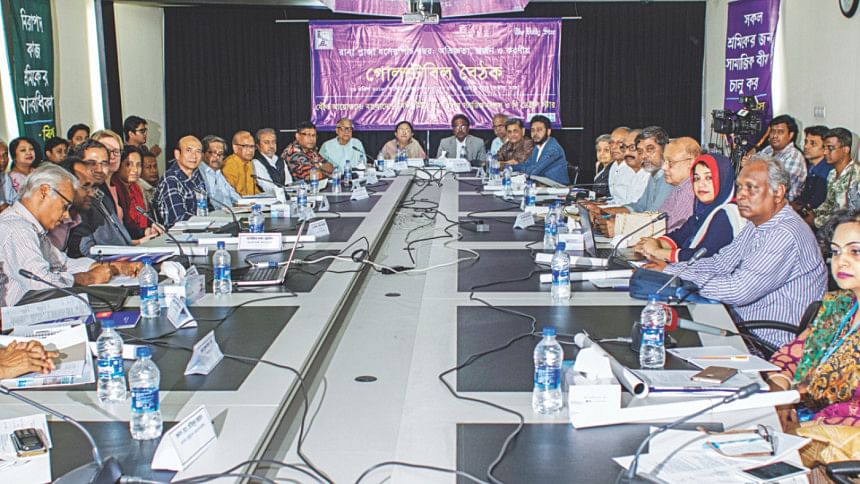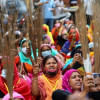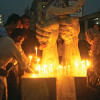Give accident insurance to workers

Workplace accident insurance should be introduced for workers in all industrial sectors to ensure security, said speakers at a roundtable yesterday.
They also said the government should hand out exemplary punishment to the people responsible for the collapse of the Rana Plaza and implement building codes properly for a better working condition at factories.
The amended labour law has narrowed the security issue of workers, said Roy Romesh Chandra, a member of the advisory council of the Bangladesh Institute of Labour Studies.
"The revised law does not cover the rehabilitation of workers in case of workplace accident. This is a weakness of the law."
Chandra's comments came at a roundtable styled 'Five years of Rana Plaza collapse: experience, achievement and what needs to be done', jointly organised by the BILS and The Daily Star at the newspaper's headquarters in Dhaka.
Chandra said the Rana Plaza collapse occurred because of the absence of the rule of law.
"The concerned government bodies that gave the approval to construct the building are responsible for the tragedy," he added.
The national building code should be followed properly and a specialised body should look into whether it is being implemented, said the labour leader.
Former labour secretary Mikail Shipar suggested amending the existing labour act to cover the complete security issue of workers.
"We need safety assessment of the plastic and chemical industries along with the garment sector," he said, adding that the workplace security standard in Bangladesh is still weak compared with the global standard.
He went on to express trepidation that security monitoring will collapse once the foreign inspection agencies, the Accord and the Alliance, leave Bangladesh.
"So, we need to give an institutional shape to our experience of the last five years." He also suggested providing compensation to the victims as per the standards of the International Labour Organisation and introducing accidental insurance.
Khondaker Golam Moazzem, research director of the Centre for Policy Dialogue, also called for bringing the workers under insurance coverage to ensure life security of workers. He said in the last five years Bangladesh managed to bounce back from the image crisis brought on by the Rana Plaza collapse.
Until now, 47 percent of the garment factories that are not members of the Bangladesh Garment Manufacturers and Exporters Association do not maintain any compliance, he said. About the new wage board, the CPD research director suggested upgrading the wage structure of the workers as the present salary is not sufficient in terms of market price.
Bangladesh's garment sector has been able to recover from the image crisis thanks to the collective efforts of the government, the Accord, the Alliance and the BGMEA, said Nazrul Islam Khan, secretary general of the BILS.
"Although we could manage compensation for the victims of the Rana Plaza collapse, it has not been given a legal shape. So, there is no legal guarantee that future victims will get compensation," he added.
Razequzzaman Ratan, general secretary of the Samajtantrik Shramik Front, said the people whose failure led to the building collapse have not been brought to justice yet. The garment sector should be looked after at any cost, said Hameeda Hossain, convener of the Shramik Nirapotta Forum.
"For this reason good governance should be ensured in the sector," she added. The BGMEA members have fulfilled all action plans assigned by the Alliance and the Accord, said Mohammed Nasir, vice-president for finance of the garment sector's apex trade body.
Md Shamsuzzaman Bhuiyan, inspector general of the Department of Inspection for Factory and Establishment, said the body does not have the authority to penalise factory owners.
Shahedul Anam Khan, associate editor of The Daily Star, assured coverage for matters pertaining to the Rana Plaza collapse in the newspaper so that the issue of worker safety does not fall by the wayside.
"If we don't do it the Rana Plaza issue will melt away in line with time," he added.
Syed Sultan Uddin Ahmmad, executive director of the BILS, moderated the programme.

 For all latest news, follow The Daily Star's Google News channel.
For all latest news, follow The Daily Star's Google News channel. 







Comments